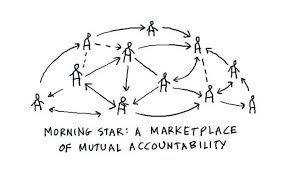
As management students start to think about their career paths, especially for those graduating soon, one of the things on their minds is how they will differentiate themselves in the job market. Better yet, the opportunists’ who will be brave enough to tackle competitive markets, what kind of unfair advantages could these entrepreneurs come up with in their businesses? Well, one suggestion is how you actually structure the company through your business model and management style. This will determine how successful you will become in the long run, because the people you hire will indeed be the backbone of the company.
Morning Star’s founder, Chris Rufer has built a tomato processing empire that is like no other business model many have never heard of until now. He calls it a “bossless” model, which consists of no managers, no titles, so no one to report to, making everyone have mutual accountability of their work. They set their own goals and meet them, creating an extreme level of achievement.

When everyone having a high degree of accountability, the company strives; therefore you can focus in on the company’s core competency, in this case, the tomato process. In the video, Morning Star demonstrates their process from start to finish, and we can see the dedication from their employees; they take pride in their work every time. It shows how workers evaluate every single tomato for quality, before going on to the next process. Innovation is also encouraged within the organization through everyone’s perspective of how to be more efficient in the process.
Consequently, when you have that amount of freedom in the workplace you can perfect a higher level of quality in your products and services, resulting in a greater profit margin or penetrating a larger market in the end. Why? There is no pressure of doing the job in just an autocratic way, unlike with the red bead Deming’s experiment; where there was no other approach besides the way the boss wanted it to be done, which is impractical in today’s advanced technological age.
Rufer says that this model of doing business is “Quite good, high-performing people love it here, and they flourish,” and it is their competitive advantage in the market. So why don’t more companies follow this model? With traditional models becoming obsolete, our generation needs to figure out other ways to conduct business, in order to distinguish ourselves from the rest. This method of organizational structure is not fit for all businesses, but it is certainly a new and inventive system of increasing productivity, quality and overall well-being in the organization.
There is a saying that people don’t necessarily quit their jobs, but actually quit on their bosses. So, what if you worked at a company where there was no boss to quit on, do you think you would be happier? And therefore, be more productive, and result in products and services having better quality that could be beneficial to everyone?
http://www.inc.com/audacious-companies/leigh-buchanan/morning-star.html
http://morningstarco.com/index.cgi?Page=Self-Management
Video http://www.smithsonianmag.com/multimedia/videos/A-Tomato-Trail.html

I think this style of management is really interesting and unique to Morningstar. I like the mutual accountability aspect, but I wonder if they ever think they deserve more recognition for their work. When someone is successful, they are often rewarded with a raise and more responsibility, so withoutout that, are people inclined to produce fewer results? There may not be incentive for people to work harder, however perhaps some working styles prefer this and like the informal power structure better. I agree with this poster when they said, “This method of organizational structure is not fit for all businesses, but it is certainly a new and inventive system of increasing productivity” because of this unique structure.
I’m curious if there are other industries that might benefit from this kind of management structure too.
This is definitely an interesting model of management for a company. I agree with the comment above that this could not apply to all business and it strictly depends on the industry. For example, if this system was implemented in retail I am strongly certain this would fail miserably. I also question if the “goals” that these employees make for themselves are low and in reality these goals could be exceeded tremendously.
I agree with you that this business model might not work for all companies. I think all employees would be much happier without a boss giving them orders and will decrease the turnover rates. The problem is how will the employees keep them self motivated? Some employees might lack that motivation and productivity will decrease. It depends how well the company motivates their employees.
This was a very interesting blog post because I never thought about working for a company that has no upper management. As the previous comments stated, I too think this model would only work for certain companies. I also think that in order for this type of management model to work, the right employees need to be hired. This would not work for someone who is looking to grow within a company. Instead this is for someone who does not particularly like having a boss, but is not in the place to be their own boss. The individuals that work for Morning Star must love their jobs because without that, they will not last in the company since there are no recognitions for good work. To answer your question, I would not be happier in this position because I need to work somewhere that has structure and a system of checks and balances.
I believe Morning Star has a great idea with this “Bossless” model. When it comes to management in the workplace, micromanaging and other regulatory actions can lead to employees becoming unmotivated and unhappy with their jobs. I believe that people are far more productive when they are given greater responsibility, and are trusted to help the business process become more efficient. Happy workers lead to motivated workers (most of the time), and I think more businesses should consider this model for their management process. In response to some of the comments above, I believe that workers would be less likely to let down their team members who need them, rather than their boss who they might now particularly like. There are so many people in management today who should not be in their position, and I think eliminating that entirely would not only increase worker efficiency, but also overall productivity and motivation.
Wow, this is very interesting. Morning Star has definitely taken a different process than other companies. This new management style (or not?) will be great for teamwork, however do you think this might lead to more slackers? Do you think maybe people will point less or more fingers in the long run? I think all employees will feel they are important but I do however think that some people do enjoy having a leadership role and taking that away from them might cause slower production. I think leadership roles such as management gives people an incentive to work harder and get “promoted” so they feel that their work is actually meaningful.